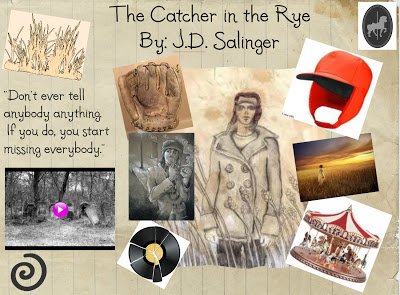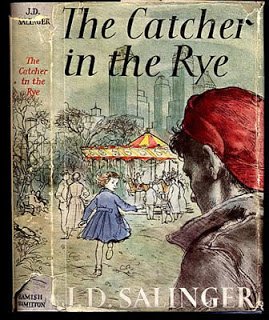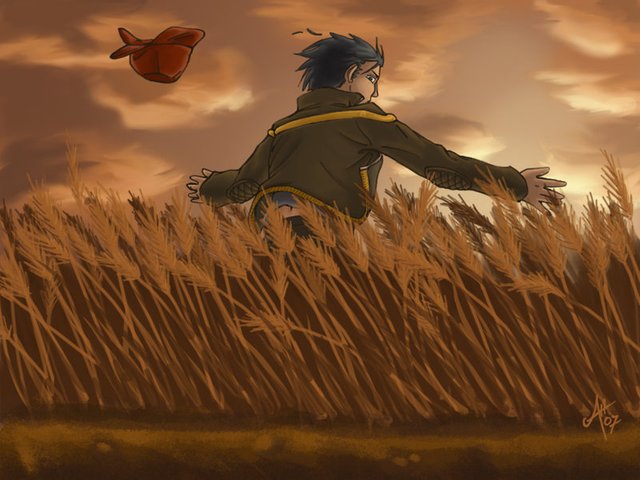"The Catcher in the Rye" and the Omnipresent Theme of Death

One of the prominent themes in the novel The Catcher in the Rye and one of great interest to the narrator himself, would be the omnipresent theme of death. It could be argued that the novel is not only full of references to death in the literal sense, physical disappearance, but also in the metaphorical, taking the form of spiritual disappearance, something which Holden often focuses on, along with the actual theme of mortality.
It is possible that this occurs in his reluctance to interact with the living world, as his means of escaping from the reality he despises, his mundane thoughts and the “phoniness” that he is surrounded with. Holden becomes increasingly attracted to the idea and comes close to obsession, as his mind is flooded with thoughts of death and disappearance, as well as questions which are revealed throughout the novel.
To begin with, it is evident throughout the novel that the narrator has been traumatised by the loss of his younger brother Allie that died of leukaemia four years before the story is told. One could support that Allie’s death influenced Holden’s attitude and perspective on life and human interactions, justifying death’s major role in the novel.

Holden himself admits that he lost control and reacted without reason on the occasion. “they were going to have me psychoanalyzed and all, I don't blame them...the night he died, I broke all the goddam windows with my fist, just for the hell of it…It was a very stupid thing to do, I'll admit, but I hardly didn't even know I was doing it, and you didn't know Allie.” Allie's death clearly troubles Holden, but he also uses his memories of Allie to comfort himself in difficult situations.
He feels that his brother’s death has been in a way unjust, saying it should have been him to have died instead and at many times proceeds to glorify him by turning him into a role model of innocence while he tries to convey this idea to the reader as well “but it wasn't just that he was the most intelligent member in the family. He was also the nicest, in lots of ways.”
To Holden innocence is something that he feels that is slipping away from him and eventually strives to preserve it in other children, while he himself is stuck in an in-between state of adulthood and childhood which he associates with hypocrisy and truth respectively.
At times it is as if he wishes for death itself instead of growing up and being a “phony” like the rest of the adults that conform to manners and social rules. He even expresses a death wish, most probably a result of deeply rooted anger at life, at more than one occasions in the novel, “anyway, I'm sort of glad they've got the atomic bomb invented. If there's ever another war, I'm going to sit right the hell on top of it. I'll volunteer for it, I swear to God I will.”
No matter however the constant references to death and disappearance one can see that Holden tries to retain a part of him throughout the novel, that of childhood and innocence which is represented by his brother Allie within his mind, "Allie, don't let me disappear. Allie, don't let me disappear". He desperately struggles against this erasure, afraid to enter the adult world and the perils it has in store. Evidence of this can be seen in his impulse to erase all the “Fuck you” on the school walls, disgusted by adults and their vulgar use of language in the microcosm of a school for children supposedly a place of untainted innocence.

In addition, he even fantasizes about his own death and its consequences “about halfway to the bathroom, I sort of started pretending I had a bullet in my guts”, as if he is willing to embrace it as a relief from the situations he is placed in and the feeling of insignificance he gets out of his life, which he feels that has no purpose, as he leads himself into nowhere. It is as if he tries to give importance to his life with his death, imagining what would happen at his funeral and even how they wouldn’t let his sister Phoebe attend, after he would supposedly die of pneumonia.
Moreover, he also relates death to being left alone which at times he seems to ask for, mostly because he is afraid of relating with people, the same way he seems to ask for death just because he is afraid to live in a world that to him seems crazy. This is clearly seen on the occasion of his interaction with Mr. Antolini whom as soon as he made an affectionate move towards Holden, he labelled him as a pervert and wished to be known as deaf-mute thereon, a metaphorical death,” I'd pretend I was one of those deaf-mutes. That way I wouldn't have to have any goddam stupid useless conversations with anybody”.
Death to him in this case acts as a form of isolation that either could be personal, social or mental. For this reason, Holden is seen at many occasions alienating people as a form of self-protection, but at the same time being his very source of pain. At times wished for death, in this case he wishes for disappearance, in his search for peace but at the same time dreads it, being his source of loneliness.

Furthermore, Holden also refers to his fears of disappearing as to not mention death, a term with which he has not fully came to terms with, “every time I came to the end of a block and stepped off the goddam curb, I had this feeling that I'd never get to the other side of the street. I thought I'd just go down, down, down, and nobody'd ever see me again”. This is also what causes him to wander if the ducks of the lake have vanished. In contrast to that come the mummies in the museum, whose death seems alright in Holden’s perspective since they did not disappear after it.
One of the reasons that Holden feels so uneasy with the idea of death is that he sees the matter bluntly without romanticizing it, unable to feel comforted by a ceremony and flowers, knowing that no one is really there to appreciate them other than the living relatives, since the body eventually decomposes and disappears.
His brother’s death however was not his only literal encounter with death, in his previous school “Elkton Hills” there was a boy to whom he lend his turtleneck sweater that jumped out of the window when he was mercilessly bullied by some classmates of his and ended up dying wearing it. “He was dead, and his teeth, and blood, were all over the place. He had on this turtleneck sweater I'd lent him”, he came across a blunt, shocking image of death that contributed into his struggle with the acceptance of mortality. In this case death acts as a symbol of freedom, a gateway, a relief from one’s troubles and responsibilities, this is its very quality that at times caused Holden to consider it unconsciously as an easy way out.
Overall, the theme of death serves to highlight Holden’s helplessness in the pretentious adult world, in which he finds himself unable to fit in. Death serves as a means of escaping from the responsibilities that the society imposed upon him. On a metaphorical level, death is his alternative choice to conforming to everything he dislikes about human relations and behaviour patterns.

One of the prominent themes in the novel is the idea that life is nothing but a series of cruel jokes played on us by fate. Holden feels that he was destined to be a failure from an early age and believes that everything that has happened to him is a result of this destiny and you can visit https://eduzaurus.com/free-essay-samples/catcher-in-the-rye/ site to get free essay there. He also comes to believe that death is a kind of release, where everyone can finally find peace.